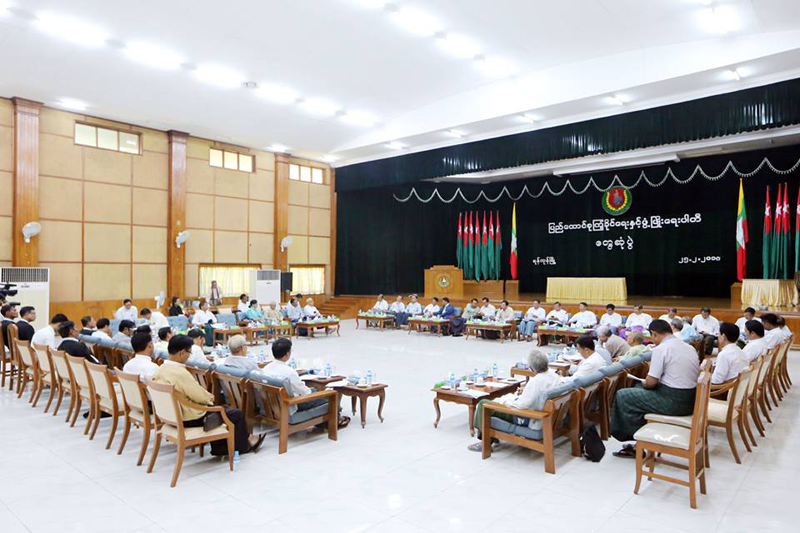About one-fifth of Burma’s political parties have raised their collective voice in opposition to matters both foreign and domestic, chiding UK lawmakers for what they deem undue criticism of the crisis in Rakhine State and panning proposed amendments to legislation on protesting that has been scrutinised for years.
The 21 political parties condemned more than 100 British MPs who last week wrote to their foreign secretary imploring him to seek a United Nations Security Council referral of Burma’s military to the International Criminal Court.
The British lawmakers specifically singled out the man at the top, Burma’s commander-in-chief, Senior-General Min Aung Hlaing, saying his “sense of impunity appears to be emboldening him.”
The military has been accused of grave human rights abuses as it has carried out “clearance operations” in Rakhine State since 25 August attacks by Rohingya Muslim militants. The top UN human rights official has termed the aftermath a “textbook example of ethnic cleansing” as more than 650,000 Rohingya have fled northern Rakhine across the border into Bangladesh.
Burmese officials at both the civilian and military levels have denied those allegations, insisting that security forces in Rakhine have been conducting a lawful counter-insurgency campaign.
Unsurprisingly, it was the military-backed and formerly ruling Union Solidarity and Development Party (USDP) that organised a Sunday gathering in Yangon of the 21 political parties that agreed to condemn the British parliamentarians’ entreaty.
That was according to the Union Daily, the USDP’s party newspaper, which reported that representatives of the political parties present on Sunday accuse members of the international community of manoeuvring to coerce the Burmese government.
In a separate statement apparently also resulting from the weekend meeting, the 21 political parties signed a joint objection to recently proposed amendments to Burma’s Peaceful Assembly and Procession Law.
The changes, put forward by a member of the ruling National League for Democracy (NLD), were submitted to the Upper House last week, and appear to be an effort to curtail quid-pro-quo arrangements when it comes to public assemblies.
“If there is evidence that a person is giving money, material goods or other types of favours to join the assembly, with the intention of disrupting security, rule of law, tranquillity or public morality … then he or she may receive a maximum sentence of three years’ imprisonment and a fine,” reads one of the prospective addendums to the existing legislation, which was enacted in 2011.
[related]
But proposed changes to the controversial legislation, which was amended in 2014, are again under fire, this time in an attack spearheaded by the very party whose former president first signed it into law.
The 21 political parties’ joint statement said “the submitted bill to amend the Peaceful Assembly and Procession Law is an attempt to curtail some provisions related to fundamental rights and duties of citizens stipulated in Chapter 8 of the Constitution and to diminish the rights set forth in the Constitution. Also, we believe the bill sets restrictions [on citizens] preventing them from pointing out or opposing the many blunders of the government.”
The statement was signed by leaders of the 21 political parties including the National Unity Party, National Development Party and Democratic Party (Myanmar). The ruling NLD was not among the signatories.



